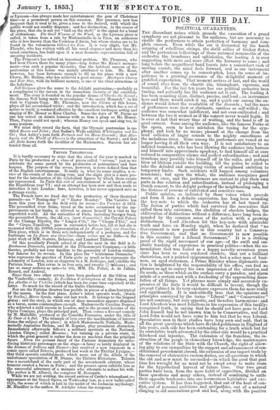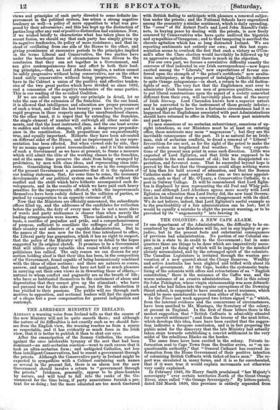TOPICS OF THE DAY.
POLITICAL &TA .1? A NTEES.
ME discordant noises which precede the execution of a grand symphony are not pleasant to the audience, but are necessary to enable the performers to attain perfection of harmony and com- plete suocess. Even while the ear is distracted by the harsh scraping of rebellious strings, the shrill sallies of tricksy flutes, and the portentous bellowings of those untamed mammoths of the orchestra the trombones and ophieleides, the leading A is ever suggesting with more and more effect the harmony to come ; and long before the magnificent band bursts into a concordant rush of moving sounds, the mind feels forward, and as one instrument after another comes up to concert-pitch, loses its sense of im- patience in a growing. assurance of the delightful moment of gratified expectation. That moment arrives at last, and the world of sound rises from the chaotic din, triumphant, vigorous, and beautiful. For the last ten years has our political orchestra been tuning, and patiently has the audience sat it out. The leading A has been sounding clear, distinct, precise, and loud ; an instrument here and there would catch it up, and a quick ear among the au- dience would detect the resolution of the discords • but the mass of performers were slow or obstinate, careless or self-willed ; the audience was somewhat indifferent, and not over-cultivated • and between the two it seemed as if the concert never would begin. It is over at last that weary time of waiting, and the band is off in good earnest. Some among the audience, like the famous Turks at the opera, seem to have mistaken the tuning for the sym- phony, and look by no means pleased at the change from the loud collision of angry sounds to the mighty smoothness of the melodious river. Some among the performers are vexed at no longer having it all their own way. It is not satisfactory to an inflated trombone, who has been blowing the audience into horrors and himself into approximate apoplexy, to find himself all at once reduced to comparative silence and perfect subordination ; and said trombone may possibly take himself off in the sulks, and perhaps blow ad libitum outside the building, till the police be called to take the deluded and annoying victim of misplaced ambition to temporary limbo. Such accidents will happen among volunteer musicians ; but upon the whole, the audience recognizes good music at once, and the performers are content to play their own parts in due relation and subordination' instead of prolonging a Dutch concert, to the delight perhaps of the neighbouring cats, but the distress of persons of cultivated and sensitive ears. Public opinion, as indicated by those voices which precede and form it into a definite expression, has long been sounding the key-note to which the orchestra has at last tuned up. The fusion of parties which had survived the necessities that called them into existence, the abolition of obsolete badges, the obliteration of distinctions without a difference, have long been de- manded by the common sense of the nation with a growing distinctness. Lord Aberdeen hit this key-note with admirable truth and force on Monday night, when he declared that "no Government is now possible in this country but a Conserva- tive Government, and that no Government is now possible in this country but a Liberal Government." It is a striking proof of the rapid movement of our age—of the swift and em- phatic teaching of experience in practical politics—when the no mendature that was hailed as a happy, novelty seventeen years since has been so soon rendered obsolete, that not a brilliant rhetorician, not a pointed epigrammatist, but a sober man of busi- ness, an aged statesman, a Prime Minister whose diplomatic cau- tion is heightened by the responsibility of his office, can find no phrases so apt to convey his own impression of the situation and its needs, as those which on the surface carry a paradox, and alarm minds of a certain cast with a foreboding of the approaching disso- lution of all things. Yet phrases more simply and accurately ex- pressive of the facts it would be difficult to invent, though the present Cabinet in its very existence expresses them far more really and significantly. It is undoubtedly true that the opinions and principles conveyed by the terms " Liberal " and " Conservative " are not contrary, but only opposite, and therefore harmonious : and Lord Aberdeen was most felicitous in his expression of this tardily- recognized truth, in saying that he should not have gone to Lord John Russell had he not known him to be Conservative, and that Lord John would not have come to him but that he was Liberal. Speculative men in their studies have long seen and said, that in all the great questions which have divided politicians in England of late years, each side has been contending for a truth which but for its correlative truth advocated by the other side would be a practical falsehood and injustice. The extension of the franchise, the in- struction of the people in elementary knowledge, the maintenance of the relations of the State with the Church, the right of allow- ing play to our sympathies by the support and advancement of con- stitutional government abroad, the extension of our import-trade by the removal of obstructive custom-duties, are all questions in which the old and new must be reconciled—in which the good that past time has wrought for us must not be swept away to make room for the hypothetical harvest of future time. Our two great parties have been, from the mere habit of opposition, divided on these questions and many others, instead of combining to unite their opposite tendencies into one harmonious legislative and exe- cutive system. It has thus happened, that out of the heat of con- flict, out of personal ambitions and antipathies, out of a natural clinging to old associations good and bad, along with the positive views and principles of each party directed to some definite im- provement in the political system, has arisen a strong negative tendency as well—a policy of mere opposition to what was pro- posed by their adversaries; and this has kept up the distinction of parties long after any real oipositive distinction had existence. Now, if we wished briefly to characterize what has taken place in the recent fusion, we should say that each party has simply given up its negative tendencies, its policy of mere resistance ; and that in- stead of oscillating from one side of the House to the other, and giving prominence at successive periods to the principles implied in the terms Liberal and Conservative, the two parties have under the beneficent force of circumstances been driven to the conclusion that they can act together in a Government, and san give contemporaneous force and effect to both their lead- ing principles,—that, as Lord Aberdeen implies, a nation cannot be safely progressive without being conservative, nor on the other hand safely conservative without being 'progressive. Thus we have in the Cabinet a union of the positive and effective tenden- cies of the two great parties which have divided us since 1832, and a concession of the negative tendencies of the same parties. This is our reading of the so-called Coalition.
If we are called upon to apply our principle in detail, let us take the case of the extension of the franchise. On the one hand, it is allowed that intelligence and education are proper precursors of such a trust, and that the last twenty years have been years of rapid progress in these respects among the nnenfranchised classes. On the other hand, it is urged that by extending the franchise, the single element of number will outweigh all other social ele- ments, and that the least instructed class, and the one least averse to sudden and violent changes, will gain a dangerous preponder- ance in the constitution. Both propositions are unquestionably true, and equally important. Hitherto they have been advocated
• on different aides of the House, and no improvement in our repre- sentation has been effected. But when viewed side by side, they by no means appear a priori irreconcileable ; and it is the mission of such a Government as we have at present, to frame a measure which will admit the elite of the working classes to the franchise, and at the same time preserve the state from being swamped by proletaires, by men with class ideas, and representing class inte- rests. Generalizing from this instance, we see in the composition of the present Government a guarantee that it is the opinion of our leading statesmen, that, for some time to come, the necessary developments of our political system can be effected without the conflict and the strife which have hitherto accompanied such de- velopments, and in the results of which we have paid such heavy penalties for the improvements effected, while the improvements themselves have been rudely defaced in the collision of parties, or pushed by exasperation to an opposite extreme of ill.
Now that the Ministers are officially announced, the subordinate offices filled up, and the addresses of the candidates for reelection before the public, the duty of every man who is not a mere slave of words and party nicknames is clearer than when merely the leading arrangements were known. These indicated a breadth of basis, a sacrifice of prejudice and pride, and a comprehensiveness of purpose, sufficient to conciliate the suffrages of all lovers of their country and admirers of a capable Administration. But in the names of the men now for the first time introduced to office,
the Liberal has guarantees which it has no right to suspect, that the policy ofthe Ministry ;ill answer in detail to the hopes suggested by its original sketch. It promises to be a Government that will utilize every valuable idea round which any section of politicians has rallied. The only reason we can discern for any section holding aloof is that their idea has been, in the composition of the Government, found capable of being harmoniously combined with the ideas of other sections : and there are natures so coarse, narrow, and malignant, that they have not half so much pleasure in carrying out their own views as in thwarting those of others — natures to whom conflict and pugnacity are as the breath of life ; who have so habituated themselves to the excitement of abuse and depreciation that they cannot give up the stimulant; who have not pursued war for the sake of peace, but for the satisfaction it has yielded to their passions. The public will see through such motives to opposition, and sectional leaders will find the applause of a clique but a poor compensation for general indignation and contempt.

































 Previous page
Previous page